How to Build a Podcast Website Using WordPress In 2021
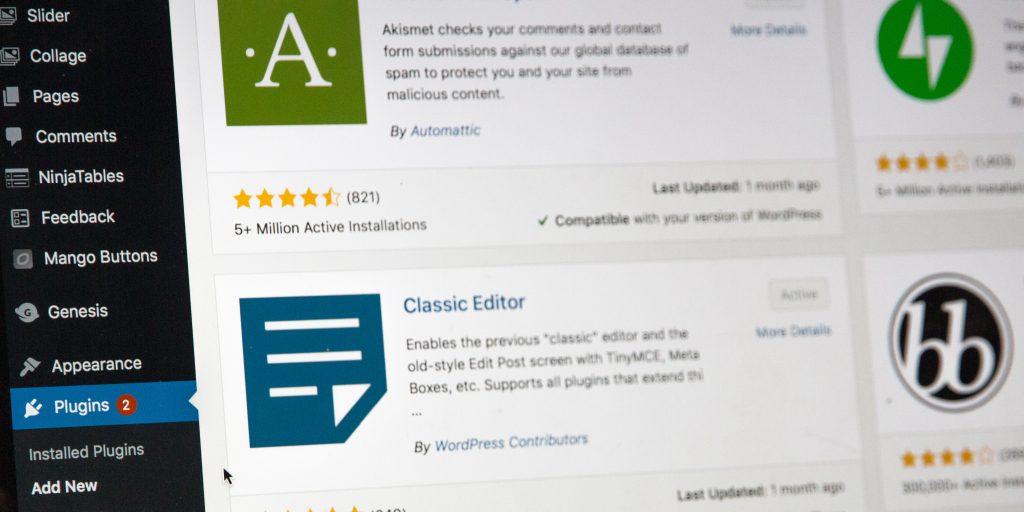
Creating a dedicated podcast website is one of the best things you can do to promote your podcast in 2021. This can help you attract more listeners, better engage with your audience and offer several types of content (like written posts, videos, images, downloads, an eCommerce shop, and more). However, as a podcaster, you may not be sure how to go about building this type of podcast website. In this post, we’ll cover the process from A to Z.
Fortunately, setting up a website is now easier than ever. There are a lot of excellent online tools to help you get the job done. With WordPress and the right podcast theme, for example, you can have your new site up and running in a matter of hours.
In this post, we’ll touch briefly on the benefits of running a podcast website. Then we’ll walk you through how to get started, step by step. Let’s get to work!
The Benefits of Creating a WordPress Podcast Website
While podcasting sites and social media platforms are essential to attracting an audience, websites still play a central role in online brand building. A good brand is especially important for your podcast – if you want to create a better image for your podcast and give a clearer vision for your listeners, you’ll want to use a unique brand. A domain name can help you coin your brand and build an entire online home around it. If you want your podcast to really take off, you can give it a head start by creating a website for it.
On your podcast website you can feature old and new episodes, share information about you or your organization, and point listeners towards key resources. Most importantly, you can set up a contact page so people can get in touch with their comments, questions, and ideas.
There are a lot of ways to build a podcast website, but we’re partial to WordPress. This free, open-source platform makes getting your site off the ground simple, yet provides access to a wealth of features for customizing it.
In a previous article, we explored the reasons creating a WordPress podcast website is such a smart idea. Right now, let’s look at how to actually get your website up and running.
How to Set Up a Podcast Website Using WordPress (In 4 Steps)
If you’ve never created a website before, don’t worry. WordPress is becoming easier to use over the years, and you no longer have to go through long and exhausting setup processes. We’re going to start at the beginning, and walk you through the fundamental steps required.
Step 1: Purchase a Domain Name and Hosting Plan
Before you can start setting up your website, you need two things. The first is a domain name, which is the primary URL for your site (i.e. yourpodcastwebsite.com). You can purchase a domain very cheaply from many places online, including most web hosts:
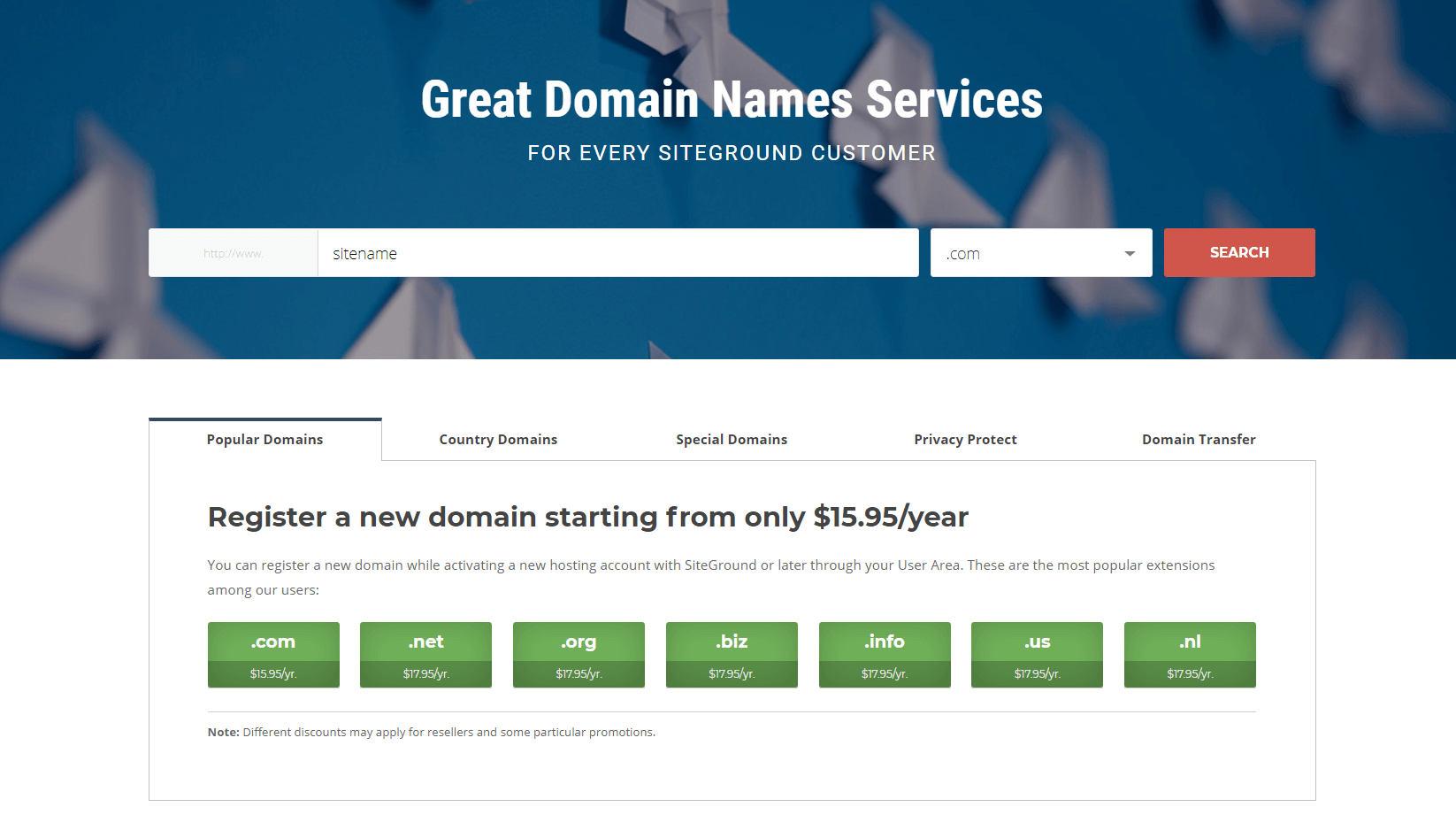
Generally, a strong domain name choice is concise, memorable, and easy to spell. You’ll likely want to use some variation on your podcast’s name – although you may want to use your name or your company’s name instead, if you’re thinking of starting more than one podcast.
As for web hosting, this is what makes your site available online. You’ll want to choose a quality hosting provider. Look for one with an excellent track record when it comes to performance, along with strong user ratings and reviews. SiteGround, Pressable, and WP Engine are all solid options when it comes to WordPress hosts.
For your hosting you’ll pay a monthly fee – often less than $10 – and in return anyone will be able to visit your site. There are many types of hosting plans, but we’d recommend sticking with a basic option at first. This should provide all the resources you need for a fledgling podcast site, and you can always upgrade later on.
Step 2: Install WordPress Through Your Web Host
With most solutions, WordPress already comes pre-installed with your website hosting plan. If that’s not the case for you, once you’ve signed up for a hosting plan, you can install your WordPress website. Exactly how you do this will vary, depending on your provider. Many offer simplified or even one-click installation features, which helps to speed up the process.
Some of the premium hosting providers will already install WordPress for you, so that’s the easiest way to get started. If you’re on a budget, you can still use one of the cheaper hosting providers and use their installation options.
Many traditional web hosts will provide you access to something called cPanel, which is a centralized dashboard where you can manage your hosting plan and website. There, you’ll want to look for a WordPress installation option, which should be clearly labeled:
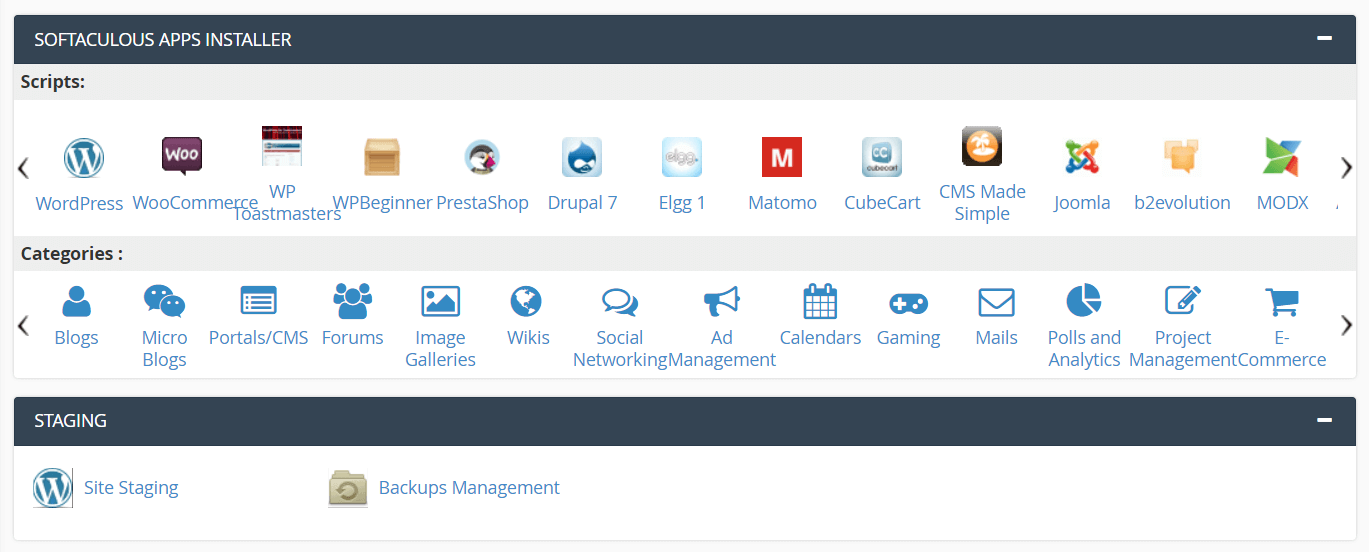
At this point, it will simply be a matter of walking through your hosting provider’s installation wizard, and providing a few basic details. At the end, you’ll have a blank but functional WordPress site, along with the admin credentials required to log into it and start making changes.
Step 3: Download a WordPress Podcast Theme
At this point, you should be looking at your new podcast site’s WordPress dashboard:

There’s a lot you can do here, and we’d recommend checking out the WordPress Codex for beginner-friendly manual on how to get started. However, before we wrap up, we’re going to focus on your two most vital customization options.
If you check your WordPress site front end side (what your website visitors see), it will look pretty simple:
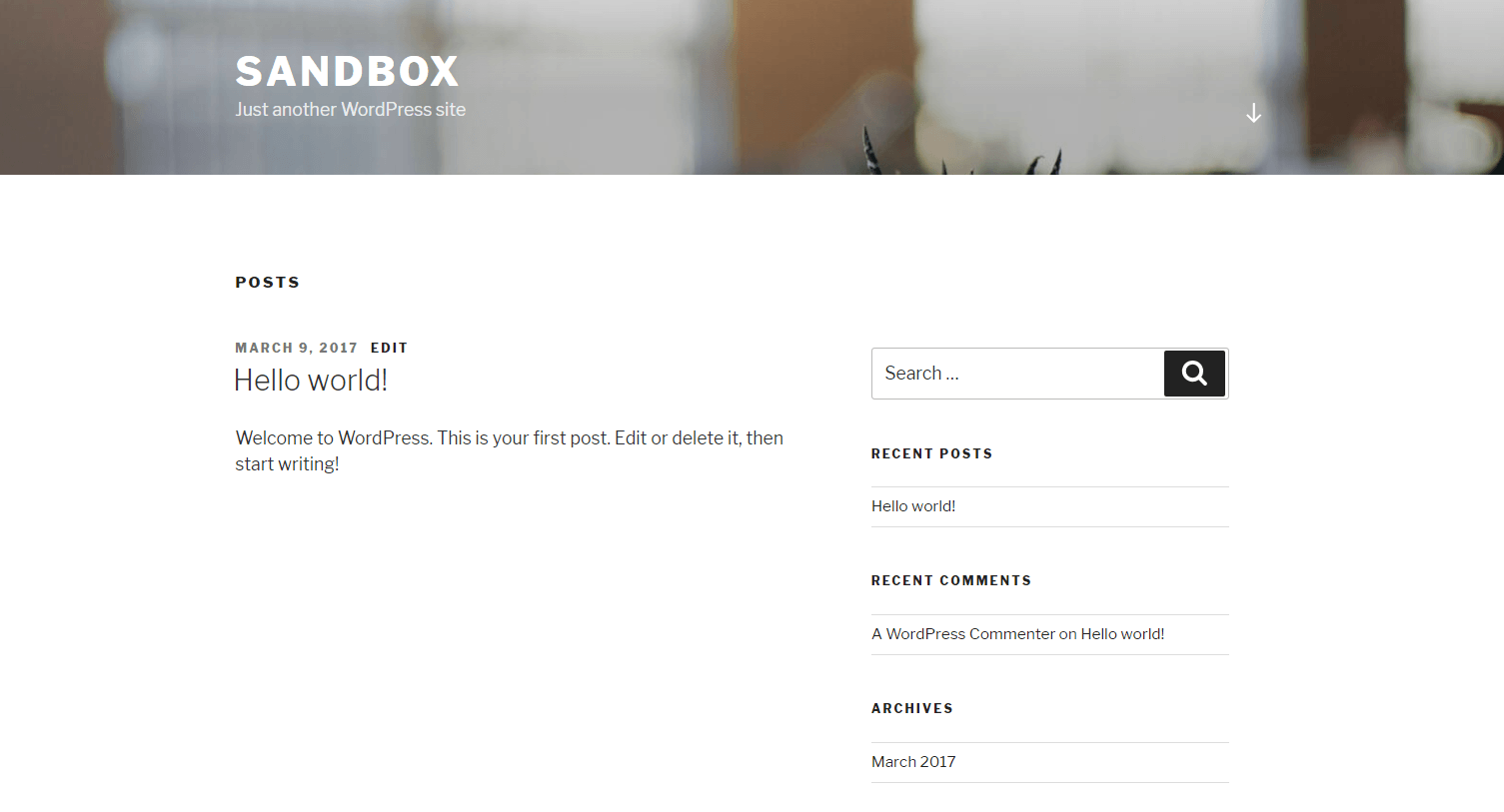
That’s because it’s currently using a default WordPress theme, which isn’t very exciting. Themes enable you to radically change the appearance and layout of your site without hiring a website designer. Luckily, there are thousands of themes to choose from.
Your best option is to look for a dedicated WordPress podcast theme. This offers a number of benefits. It will ensure your site’s ‘look’ matches its purpose, for one thing. Additionally, a quality podcast theme will include layouts and functionality that let you display your podcast in the best light.
Dixie, for example, is a great WordPress podcast theme with a clean and modern look:
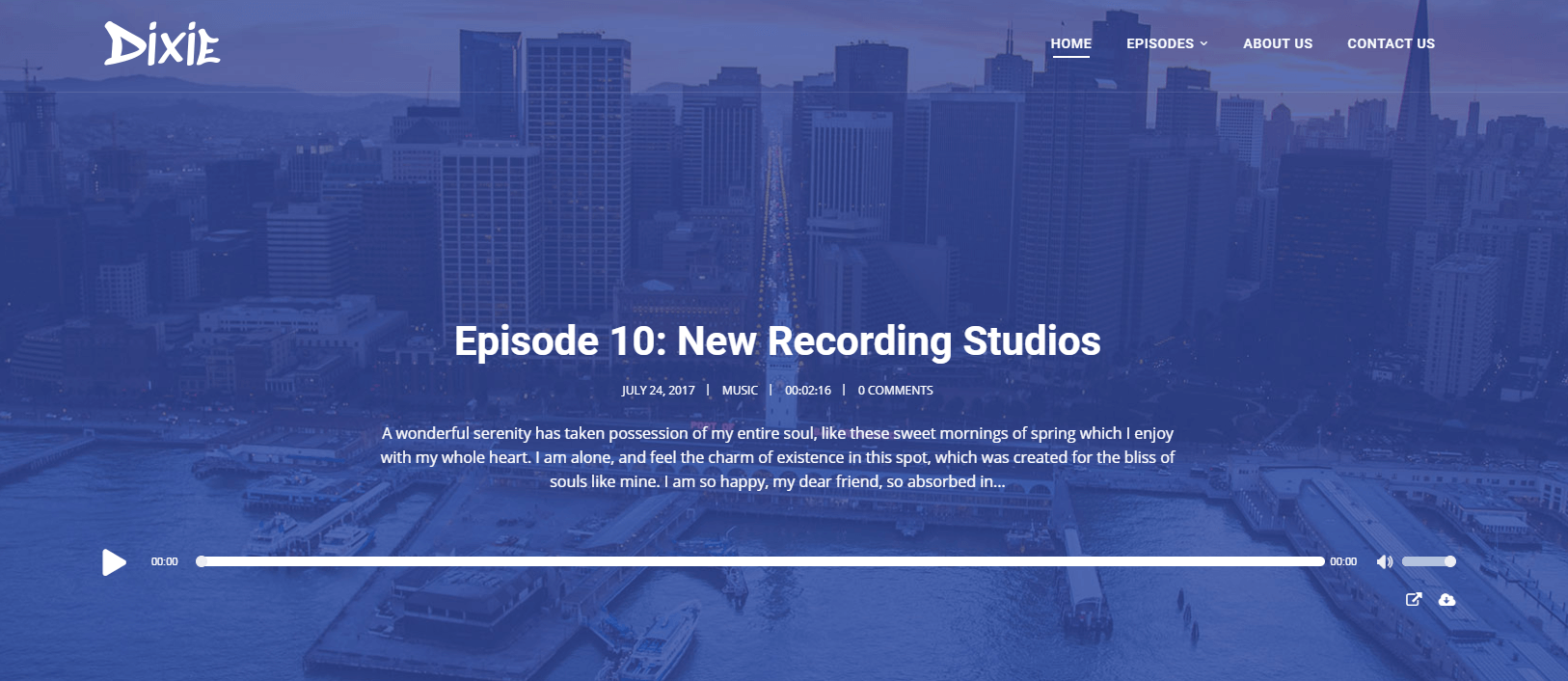
It provides multiple display and layout options, supports both locally-hosted and embedded audio files, and more. Plus, it lets you customize your podcast website easily, adding your own visuals and branding.
Once you’ve chosen a theme, installing and activating it is a quick process. And now you’re on to the last phase.
Step 4: Add Key Features Using Podcast Plugins
In a way, WordPress plugins are a lot like themes. They’re individual add-ons you can install on your site, in order to customize it. However, plugins provide your site with new features and functionality, rather than just changing its appearance.
There are a lot of useful plugins for nearly any WordPress website. As a podcaster, however, you may want to seek out one or more quality podcast plugins. A few of the top options to check out include:
- Seriously Simple Podcasting: This is a useful entry-level tool, which provides a customizable media player and a few other key features.
- Podcast Importer: One of the most important aspects of having a podcast website is to ensure it is always in sync with your latest episode. This plugin helps you import your entire podcast and continuously import your new episodes automatically.
- Podcast Subscribe Buttons: With this plugin you’ll be able to add beautiful buttons to all the different podcast destinations/platforms you’re on. The plugin makes it really easy to add buttons or icons into any page on your site.
- Podlove Podcast Publisher: A more advanced tool, this plugin offers a high level of customizability when it comes to your media players and podcast playlists.
Each of these plugins can help turn your default WordPress site into a podcasting powerhouse. All that’s left is to start uploading your episodes!
Conclusion – setting up a podcast website
Podcasts have never been more popular – which means it can be a challenge to carve out your own space. Building a dedicated podcast website is the perfect way to stand out from many of your competitors, and create an actual community around your work.
The good news is that setting up a podcast website is simple, especially if you’re using WordPress. You’ll just need to:
- Get a domain name and a web hosting plan.
- Install WordPress through your web host.
- Download a WordPress podcast theme.
- Add key podcasting features using plugins.
Do you have any questions about how to create an effective podcast website? Let us know in the comments section below!
